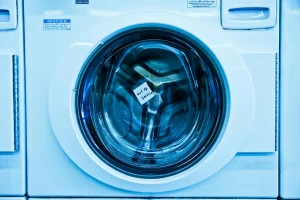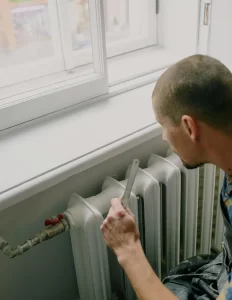 Perhaps you just moved into a brand-new house, or maybe you’ve been in your house for decades. Due to today’s high home prices and steep interest rates, it is even possible you’ve decided to stay in your home a bit longer than planned. Whatever your situation, there are ways to protect your home and what is in it, helping to ensure not only that things are in good and working order but to curb any unexpected expenses and surprises.
Perhaps you just moved into a brand-new house, or maybe you’ve been in your house for decades. Due to today’s high home prices and steep interest rates, it is even possible you’ve decided to stay in your home a bit longer than planned. Whatever your situation, there are ways to protect your home and what is in it, helping to ensure not only that things are in good and working order but to curb any unexpected expenses and surprises.
NEW CONSTRUCTION PROTECTIONS
 If you’ve recently had your home built, it is important to know your builder is required, by law, to offer a limited 10-year warranty. This warranty is specifically to protect against any defective materials or devices that may have been used when building your home. Builders have the option to utilize one of six state-approved private plans, otherwise they are automatically enrolled in the NJ New Home Warranty Program offered by the state.
If you’ve recently had your home built, it is important to know your builder is required, by law, to offer a limited 10-year warranty. This warranty is specifically to protect against any defective materials or devices that may have been used when building your home. Builders have the option to utilize one of six state-approved private plans, otherwise they are automatically enrolled in the NJ New Home Warranty Program offered by the state.
If you have an issue, this warranty protects the builder and ensures your issue will get resolved. If the builder does not make good, the State of New Jersey New Home Warranty Security Fund or the contractor’s private warranty fund, covers the costs. When registering to build the home, the builder must pay a fee into the state program, regardless of which warranty they choose.
According to nj.gov, “During the first year of a new home’s warranty, warranty coverage extends to defective systems, workmanship, materials, plumbing, electrical and mechanical systems, appliances, fixtures, and equipment, and major structural defects. From the commencement date of the warranty up to two (2) years from that date, the mechanical, electrical, and plumbing systems and major structural defects are covered. The builder is responsible for warranty coverage during the first two years. During the third through tenth years of coverage, only major structural defects are covered.”
WARRANTY FOR ANY HOME
After that ten-year mark or when purchasing a home that is not new construction, there are also warranty options. These are less about defects than they are about taking away some of the burden when issues may arise. According to Forbes, only 4% of American homeowners have a home warranty, likely because most people do not know enough about them. For some homeowners, they can be a perfect financial fit, for others, they may not be worth the expense. So, it is important to price them out before committing.
 Companies such as American Home Shield, Select Home Warranty and Liberty Home Guard offer varying forms of coverage throughout New Jersey and elsewhere to repair or replace your systems and appliances, due to normal wear and tear. This is different than insurance, which protects against damage, and rather helps when something is broken or stops working. It bears similar risks to insurance, such as you may pay for it and never need it. But, if you need it, it may help cover costs you would instead have to pay for out of pocket.
Companies such as American Home Shield, Select Home Warranty and Liberty Home Guard offer varying forms of coverage throughout New Jersey and elsewhere to repair or replace your systems and appliances, due to normal wear and tear. This is different than insurance, which protects against damage, and rather helps when something is broken or stops working. It bears similar risks to insurance, such as you may pay for it and never need it. But, if you need it, it may help cover costs you would instead have to pay for out of pocket.
For example, your furnace stops working. You don’t know why or how to fix it. Instead of asking around, you contact your warranty service for a technician to assess and fix the problem. Your premium covers the labor, though there may be a service fee/deductible for a visit or to cover any parts if repairs are needed. If it needs to be replaced, the warranty usually covers a new furnace, up to a certain price (and certain brands). There are a variety of variables related to the cost of replacement parts or how much the warranty will pay for a new unit, depending on which company or plan you choose.
In order to find the best warranty plan for you, collect quotes from multiple companies. Then compare the coverage that each offers such as what is included or excluded and what limits there are on brands, age, etc. Make sure yours are included! You also want to take a look at your own financial health, to determine whether or not you have enough money saved for unexpected repairs or if you’re better putting out money in advance, just in case.
Here are a few of the major differences between the warranty plans:
- Some require you to use their chosen technicians, others provide you with options to choose from, or let you choose your own
- Some plans include electrical systems (such a breakers, fuse boxes, wiring) and some do not
- Plumbing coverage is an option that not all warranties offer, including septic and sump pumps
- Not all include roof coverage for wear and tear
- Appliances are also not included in all home warranty plans
Sometimes, if your equipment and systems are well-maintained or they don’t qualify for a warranty, paying as needed can be the better choice. Just make sure that you have an emergency fund set aside, so you are not caught in a bind should there be a major, unexpected failure. They do happen to the best of us.
PSE&G ASSISTANCE
In our area, as customers of PSE&G, there is also the option to use PSE&G WorryFree Protection which, for an annual cost, covers things that use electricity or gas. Their plan offerings include for heating, cooling, kitchen and laundry protection. There are also plans available to cover other natural gas appliances such as a pool heater, grill or fireplace.
“If a customer suspects their system is not operating properly, they can schedule an appointment to have the equipment repaired. The best thing a homeowner can do to keep their heating system operating properly is to change the air filter monthly, which will ensure proper airflow,” shares PSE&G Appliance Service Program Support Manager Mike Sawicki.
 Each plan is specific to certain items. For example, the heating coverage options include gas furnace/state boiler, standard water heater, exposed indoor gas piping, ductless heating & cooling, exposed indoor gas piping and standard heat pump whereas the cooling plans cover your central A/C and offer add-ons to include ductless heating & cooling and standard heat pump as well. If you opt for a kitchen plan, those cover your dishwasher, stovetop, refrigerator, freezer and oven, but your washer and dryer coverage would be through a laundry plan.
Each plan is specific to certain items. For example, the heating coverage options include gas furnace/state boiler, standard water heater, exposed indoor gas piping, ductless heating & cooling, exposed indoor gas piping and standard heat pump whereas the cooling plans cover your central A/C and offer add-ons to include ductless heating & cooling and standard heat pump as well. If you opt for a kitchen plan, those cover your dishwasher, stovetop, refrigerator, freezer and oven, but your washer and dryer coverage would be through a laundry plan.
PSE&G does provide discounts if you bundle (10% off for 3 or more plans) and when it comes to the heating, cooling and laundry plans, all brands are covered. Be aware that with kitchen coverage, most brands are included but some are under the elite tier pricing at a higher cost.
“With WorryFree Protection Plans, there are no deductibles, trip charges or out of pocket expenses on covered components. Customers can review a full breakdown of all covered repairs and components on our website. Additional benefits of the program are a free membership to Buyers Edge which offers customers discounts on new appliances and electronics. In addition, customers have the option for remote diagnostics through our Tech Talk Program on select kitchen appliances,” Sawicki explains.
Should you end up needing to replace an appliance, the PSE&G plans do not offer you any discounts to do so. If you think the end of life of something is approaching, stay alert for replacement promotions they will send you throughout the year, that can offer competitive pricing options.
GOING SOLAR TO SAVE
 Whether or not you are protecting your electrical systems and appliances, you could save money by running them with a different type of energy and at the same time, increase the value of your home. You will need to do the math to make a guesstimate on whether you will be in your home long enough to see the return on your investment, but going solar, especially in New Jersey, can have its benefits. The Garden State has a goal of having 4.1% of its electricity sales coming from solar by 2028. To get there, they have created incentives for homeowners to encourage more to install it.
Whether or not you are protecting your electrical systems and appliances, you could save money by running them with a different type of energy and at the same time, increase the value of your home. You will need to do the math to make a guesstimate on whether you will be in your home long enough to see the return on your investment, but going solar, especially in New Jersey, can have its benefits. The Garden State has a goal of having 4.1% of its electricity sales coming from solar by 2028. To get there, they have created incentives for homeowners to encourage more to install it.
The first happens as soon as you buy it, the Solar Energy Tax Exemption. Like the name implies, the purchase of your solar panels is exempt from sales tax.
The next two incentives work by providing benefits for the more solar energy you use, and additionally, the less energy you pull from the grid. As your solar panels take in energy from the sun, it is measured in megawatt-hours (mWh). New Jersey’s Successor Solar Incentive (SuSI) Program offers up Solar Renewable Energy Credits (SREC) for every mWh you produce through solar. All you need to do is register your solar system, open an account that tracks your credit generation and then register on InClime (the SREC-II Administrator) to receive payment.
Additionally, through Net Metering, homeowners can sell excess energy to the grid in exchange for credits to your energy bills. You must first connect your system to the grid, then in the event you don’t need to use electricity from it (if there’s a particularly sunny month and your solar can cover your needs), these credits will be applied to your account thereby lowering, or eliminating, your electric bill. You’ll receive the credit on your bill at the end of each year.
New Jersey is so eager for everyone to go solar, they have also created a provision that if the value of your house increases due to the installation of solar, you will not have to pay higher property taxes for that extra value.
One last benefit, this one from the federal government, is the Residential Clean Energy Credit, where, if you install a system between now and 2032, you can claim 30% of your solar installation costs on your next Federal income taxes for a tax credit.
One caveat of all of this, is that your home needs to have a roof amenable to solar installation. Clay or slate roofs can break and are not ideal bases. To maximize the advantages of solar, you also want to have a roof that gets direct sunlight. South-facing roofs are best, but other directions can pull in the energy as long as there is nothing blocking the sun’s rays.
Most NJ homes get phone calls regularly from companies offering to help you get solar, and sometimes offering it for free. Those calls are not coming from the New Jersey Board of Public Utilities (NJBPU), but from private companies and sometimes they are scams.
“The State of NJ/NJBPU does not have a program that offers free solar panel installation for residents of the state. Any claims that such a program exists are false,” NJBPU and NJ Clean Energy explains as a scam warning to everyone.
If you want to move towards cleaner energy and are considering solar, all NJ incentive programs sponsored by NJBPU can be found here.
THE BENEFIT OF INVESTING IN YOUR HOME
 To keep your home well-kept does require effort and sometimes, money. Just like the human body, regular check-ups can help to ensure that things are well cleaned, and necessary updates are made. Doing so could prevent your need for service or repairs. Heating, ventilation and air conditioning companies (HVAC), for example, offer annual or bi-annual maintenance packages that help you to do this. You could also invest in dryer duct cleaning and home air duct cleaning, to help ensure there are no back-ups and things are venting and passing through properly. Just be careful, there are also frauds that advertise these services.
To keep your home well-kept does require effort and sometimes, money. Just like the human body, regular check-ups can help to ensure that things are well cleaned, and necessary updates are made. Doing so could prevent your need for service or repairs. Heating, ventilation and air conditioning companies (HVAC), for example, offer annual or bi-annual maintenance packages that help you to do this. You could also invest in dryer duct cleaning and home air duct cleaning, to help ensure there are no back-ups and things are venting and passing through properly. Just be careful, there are also frauds that advertise these services.
As with any company you bring into your home, proper vetting is advised. Check the Better Business Bureau to confirm they are legitimate and don’t have any major complaints or citings against them.

Lisa Jacknow spent years working in national and local news in and around New York City before moving to Princeton. Working as both a TV producer and news reporter, Lisa came to this area to focus on the local news of Mercer County at WZBN-TV. In recent years, she got immersed in the Princeton community by serving leadership roles at local schools in addition to volunteering for other local non-profits. In her free time, Lisa loves to spend time with her family, play tennis, sing and play the piano. A graduate of the S. I. Newhouse School of Public Communications at Syracuse University, Lisa was raised just north of Boston, Massachusetts but has lived in the tri-state area since college. She is excited to be Editor and head writer for Princeton Perspectives!
